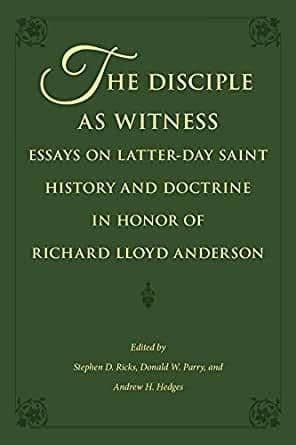Book
20 Chapters

Gary P. Gillum
My friendship with Richard Lloyd Anderson began long before a new library assignment placed me in an office a mere thirty feet from his. As an adult convert to the church and a colleague who also taught New Testament, I discovered very early in my frequent conversations with Richard that he had been responsible for the famous Anderson Plan for Effective Missionary Work.1 This background was the catalyst for a new missionary hymn.
A 1996—97 issue of BYU Studies included a beautiful poem by Dr. Arthur Henry King:
Though Rome’s lance pierced the Crucified, Her peace allowed His word. Now free men live where Joseph died By mob and law unheard. We love the right in any land; The wrong, by gospel truth withstand; But first we follow, voice and hand, Our Savior, Master, Lord.
From Deseret, first Zion’s hearth, When east and north toiled west, He sent their sons about the earth To gather in the best. But, as the western church grew strong, He bade men stay where they belong To add new Zion to the throng And strengthen all the rest.
“Christ reigns!” lake-valley, ocean-peak, And continent proclaim. In every language brethren speak, Our hearts and tongues aflame, From northern straits to boisterous Horn, To sunset from the gates of morn, With those long dead and those new born, We praise His holy name.2
As I read the poem, an original hymn tune thrust itself into my mind so forcefully and insistently that nothing else was as important as noting down the melody so that it would not be lost forever. With the oral history center being nearby, I fairly ran to borrow a tape recorder and cassette tape so that I could sing the new tune into the recorder. That evening I listened to my vocal rendition often enough that I could note it on music manuscript paper. Harmonization naturally came next, and I am indebted to Ruth Ann Hay, a library colleague, whose knowledge of music theory enabled me to have the full music for a hymn. In the midst of working out the harmony, I called Dr. King for permission to use his poem along with my music. After singing the third verse to him over the phone, he enthusiastically endorsed it, calling it a “simple and straightforward” melody.
After that telephone call, I learned that the first musical phrase recalls that beloved English folk tune, “British Grenadiers,” while the third line evokes a few measures from the Rhosymedre hymn tune, “Our Father, by Whose Name.”3 Both allusions are English, and the overall spirit of the hymn tune is Anglican, harking back not only to Dr. King’s pre-LDS heritage but to mine as well. The words, however, are a distinct and worthy commemoration to Dr. Richard Lloyd Anderson as an erstwhile missionary and a teacher of missionaries as he sought—and seeks—to help the church spread the gospel to “Every Kindred, Tongue, and People.” Moreover, the inspiration for the text and music of the hymn is a testimony to all who seek the gifts of the Spirit and are willing to listen to the voice of revelation.
Book
20 Chapters
Items in the BMC Archive are made publicly available for non-commercial, private use. Inclusion within the BMC Archive does not imply endorsement. Items do not represent the official views of The Church of Jesus Christ of Latter-day Saints or of Book of Mormon Central.